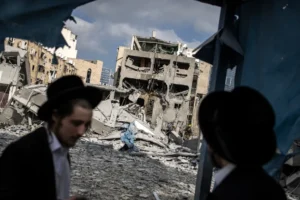Israel and Iran on the Brink: A Deep Dive into the Rising Conflict and Its Global Impact:-
The long-standing conflict between Israel and Iran has reached new levels of tension in recent times. Though both countries have never officially declared war, they have been involved in shadow warfare for decades. This includes cyberattacks, drone strikes, targeted assassinations, and support for opposing militant groups. In 2025, the conflict took a dangerous turn with direct attacks, creating fear of a wider war in the Middle East.

Beginning of the Conflict
The problems between Israel and Iran date back to the Islamic Revolution in Iran in 1979. After the revolution, Iran changed its foreign policy and started opposing Israel openly. Iran began to support militant groups like Hezbollah in Lebanon and Hamas in Gaza, which are considered enemies of Israel. Over the years, these actions created deep mistrust and frequent indirect clashes between the two nations.
Nuclear Program and Global Concern
One of the main issues in the Israel-Iran conflict is Iran’s nuclear program. Israel believes that Iran wants to develop nuclear weapons. Iran has always claimed that its nuclear program is for peaceful energy purposes. However, many countries, especially Western nations, worry that Iran could one day make a nuclear bomb. Israel has carried out several cyberattacks and secret missions to delay or stop Iran’s nuclear progress. In response, Iran has used drones and missiles against Israeli-linked targets.
Key Events in 2024 and 2025
In April 2024, Israel bombed the Iranian consulate in Damascus, Syria. This airstrike killed several officers of Iran’s Revolutionary Guard. Iran was deeply angered and soon after launched drone and missile attacks targeting Israel. Most of these were intercepted by Israeli air defense systems, but it marked the beginning of direct strikes between the two.
Later in October 2024, Iran launched nearly two hundred missiles at Israel under an operation it named True Promise Two. The missiles targeted Israeli military airbases and civilian areas. Although most of them were stopped mid-air, some caused damage, making this one of the boldest attacks by Iran.

Operation Rising Lion – Israel’s Big Move
On 13 June 2025, Israel carried out a major military operation called Operation Rising Lion. It was one of the most aggressive actions taken by Israel in recent times. The operation targeted over one hundred sites in Iran. These included military bases, nuclear facilities, missile factories, and communication centers.
The strikes were launched on key Iranian cities including Tehran, Isfahan, and Natanz. Israeli forces used advanced drones and aircraft. One of the first steps of the operation was the destruction of Iran’s air defense systems. This made it easier for fighter jets to enter Iranian airspace. The goal was to weaken Iran’s missile and nuclear capabilities.
The result was large-scale destruction. More than two hundred people were killed, many of them civilians. Hospitals, schools, and power supply networks were damaged in cities like Tehran. Many families were forced to leave their homes and find shelter elsewhere. International media reported the scenes of smoke, injured people, and damaged buildings as heartbreaking.
Iran’s Reaction
Iran did not stay silent. Within a few hours of the Israeli airstrikes, Iran launched its own missile and drone attacks on Israeli targets. This time, some missiles managed to bypass Israel’s defense systems and hit civilian areas. Iran also warned of a stronger response if Israel carried out more attacks.
Protests broke out in many parts of Iran, and people were seen chanting slogans against foreign aggression. Iran’s military chiefs promised that they would protect their country and take revenge for the loss of lives.
World Reaction and International Concern
The global community quickly reacted to this sudden rise in tensions.
The United States, a close ally of Israel, supported Israel’s right to defend itself. However, American leaders also called for calm and restraint. The European Union asked both countries to avoid actions that would harm civilians. The United Nations expressed concern over the loss of innocent lives and urged for peace talks.
Neighboring countries like Saudi Arabia and the United Arab Emirates were worried too. Any full-scale war between Israel and Iran could spread across the Middle East and affect oil supplies, trade, and regional peace.
Impact on the People
The biggest victims of this conflict are ordinary people. In Iran, thousands of people have lost homes or loved ones. Many are afraid to go outside. Hospitals are full of injured civilians. Basic services like electricity and water have been disrupted in several cities.
In Israel too, people are living in fear. Air raid sirens often warn of incoming missiles. Families have to take shelter in underground bunkers. Schools and public gatherings have been suspended in many parts of the country.
Possible Future Outcomes
Experts say that this conflict can go in different directions. There are three major possibilities.
First, it could turn into a full-scale war. This would be dangerous for the whole region. Countries like the United States and Saudi Arabia might get involved, and the war could spread to places like Iraq, Syria, and Lebanon.
Second, the conflict might lead Iran to speed up its nuclear program. After being attacked, Iran may feel that having a nuclear weapon is the only way to protect itself. This could bring more danger in the future.
Third, there is hope for peace. Many global leaders are calling for talks and peaceful solutions. If both Israel and Iran agree to new agreements with strong inspections, the situation can be controlled.
Global Economic Effects
The conflict is already affecting world markets. Oil prices have gone up because Iran is a major oil producer and any war in the region affects supply routes. Stock markets around the world have become unstable. Countries like India that import oil from Iran are facing increased costs.






